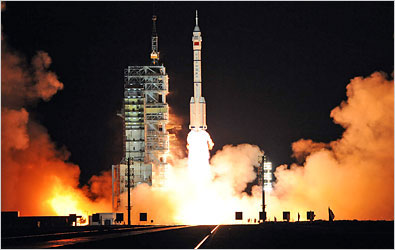By Alexei C. Summers (Contributor) – Email
Date Posted: October 11, 2011
Print Edition: October 5, 2011
 Since the dawn of time mankind has been fascinated with the mysteries of space, but is it becoming too expensive, and perhaps even too pointless to continue exploring it?
Since the dawn of time mankind has been fascinated with the mysteries of space, but is it becoming too expensive, and perhaps even too pointless to continue exploring it?
It has been decades now since the Space Race came to an end, with the conclusion of the main fronts of the Cold War. As of today, in North America, the United States Government is slowing down its own space program in the wake of the huge financial deficit that has its head in a vice, and is nearing the country to the brink of complete economic and systematic collapse. The Americans were once a nation who in 1969 boasted of having been the first nation to reach the moon, and thus beating the Soviet Union in the Space Race. The United States spent the next several decades piling loads of money into the space programs, such as in the International Space Station, and sending satellites out with artifacts from Earth, hoping that extra-terrestrial aliens might discover them, and learn of life on Earth. And of course who can forget President Reagan’s famous Star Wars defence program set up to prevent the West from the “Evil Empire” of the Soviet Union? Fast forward to now. The United States has shut down several vital departments of NASA, such as US President Barack Obama’s 2011 Budget Cut Request to cut the space agency’s Constellation program entirely. The request stipulates that the International Space Station will be removed by 2020, and after that there will be no American 21st Century space programs.
China, however is showing no signs of reducing their own space programs in the same fashion as the USA. In fact, the Asian superpower nation is taking steps to further enhance their endeavours in outer space. The People’s Republic of China is celebrating their recent launch of the new unmanned Tiangong 1 module spacecraft. It was successfully launched into orbit at 13:16 UTC on September 29, 2011, placing Tiangong 1 into a low-earth orbit.
Now that the United States of America is in debt (of which a large part is owed to China) and can no longer continue their own conquests in space, China remains the one of the only nations able to actually have the potential to achieve the goal of landing on the moon, and exploring the deep uncharted regions of the universe.
But one must ask the question – now that the Cold War is over, just like the space race is over, and the arms race as well, what relevance does space exploration, and space travel really have in our modern day setting? Originally, during the Cold War, there was a growing need for the Americans to get to the moon first, and there was a great push to beat the Russians to it. The Americans did beat the Russians, driven by the crippling fear of Intercontinental Ballistic Missile (ICBM) arsenals being used from space against NATO powers. But now, all that is in the past, and the only real reason to explore space today is to look for the undiscovered – is it really necessary? Also, as citizens of the world, we must ask ourselves if the cost outweighs the benefit.
Most commonly, spacecraft launches in our modern day and age are for explorations of other planets. An example is the American exploration of Mars with the “Opportunity” Rover, which combs the surface of the barren planet searching for signs of living organisms. But these programs are expensive. Rockets aren’t cheap to build, and there is no real monetary profit in it for the governments launching them, and they yield little results in these times of economic strife.
With the US and European governments in the precarious state they are in, perhaps it is best to leave it to the Chinese. After all, they were some of the earliest ancient astronomers to look up to the night sky.


